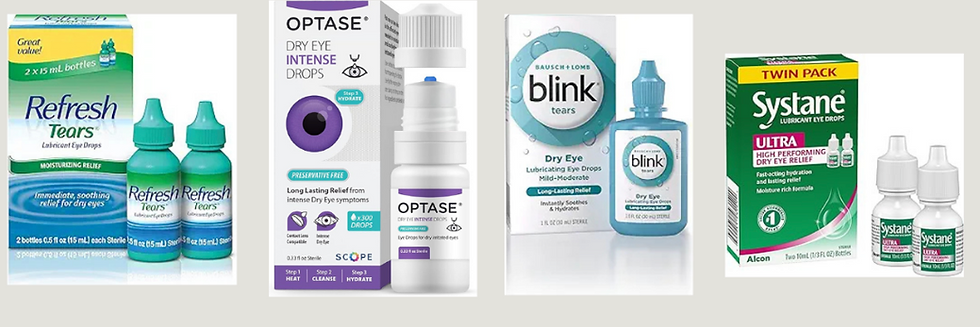EYE HEALTH
- Sarahane
- Jun 25, 2025
- 3 min read
Being a surgical coordinator for centers like Sibia Eye Intitute, it's common to have seen hundreds of people get treated for eye diseases. In this month's newsletter, we'll take a look at some facts and tips on keeping your eyes healthy; while also covering 4
major eye diseases affecting the US population.
PROTECT YOUR EYES & LIDS
As we age, our skin starts to wrinkle due to sun exposure. That is why dermatologist recommend using sunscreen when you will be exposed to the sun for
prolonged periods. The same thing goes for our eyes. UV light ages all structure in our eyes, which can cause cataracts, macular degeneration, eyelid cancers, and even corneal sunburns.
Never look directly at the sun! This WILL burn your eyes, especially during
the solar eclipse! Wear sunglasses that block at least 99% of both UVA and UVB rays; even
on cloudy days.
Apply sunscreen around your eyes: The eyelid and eyebrow region is especially susceptible to skin cancer. Aging eyelids can cause ptosis (droopy eyelids) which can cover the
pupil; limiting or blocking vision.
Poor eyelid hygiene, like not cleansing eyelids or removing make up before bed, can cause dry eyes and blepharitis. A good quality eye cream will help keep the eye area hydrated and slow down aging process.
Swimming or sleeping with contact lenses can cause eye infections! Wear protective eyewear when doing things like using power tools, mowing the lawn, or playing sports to prevent eye injuries Increase your consumption of foods with beta carotene to keep eyes healthy!
This includes foods like salmon, carrots, sweet potato and leafy greens.
Rubbing your eyes can cause eye infections, changes to vision, thinning
of the cornea or retinal detachment.
Always wash your hands before touching your eyes, use a warm compress to avoid irritation, and use eye drops or artificial tears to flush out foreign materials. Keep eyes moisturized to prevent irritation and blurry vision!
OPTAMOLOGIST RECOMMENDATIONS

NUTRIENTS FOR EYE HEALTH

Vitamin A: Keeps cornea healthy and protects retina from UV rays!

Vitamin C: Protects eyes trom oxidative damage!

Omega 3's: Slows down the progress of age related macular degeneration

Vitamin E: Fights free radicals which may damage proteins in the eye

Lutein and Zeaxanthin: Keeps the eyes lubricated, protect from blue light (computers, tablets, smartphones) and UV radiation
OPTAMOLOGIST RECOMMENDATIONS

GLAUCOMA
Abnormalities in the eye's drainage system can cause fluid to build up, leading to excessive eye pressure. That causes damage to the optic nerve, which can lead to vision loss and blindness.
Glaucoma is more prevelant in people of African and Carribean descent, than any other population.
Smoking cigarettes and excessive caffeine intake can increase the risk of Glaucoma.
Having Diabetes, High Blood Pressure, and Sickle Cell Anemia greatly increases risk of glaucoma. You are also more likely to develop Glaucoma if it runs in
your family.
(DO RESEARCH TO SEE IF THIS GENERATIONAL CURSE RUNS IN YOUR
FAMILY TO BREAK IT EARLY!)
CATARACT
It is estimated that by age 65, more than 90% of people in the U.S. will have developed cataracts.
Cataracts are caused by changes to the fibers and proteins in the eye, which can be a result of aging, UV light exposure, injuries and/or long term use of steroid medications.

Cataract surgery is preformed by an Ophthalmologist, by making a slight incision and using a phaco (a small vacuum-like tool), to extract nuclear material and replace a clouded lens of an eye with an artificial lens.
AGE-RELATED MACULAR DEGENERATION

Age-related macular degeneration (AMD) DRY AMD Unusually fuzzy or distorted
vision WET AMD Blind spot in centre of field of vision AMD is a chronic eye disease that causes gradual vision loss in the Macula (the rear portion of the Retina). This is the leading cause of vision loss in people over the age of 55. People who are smokers, have high blood pressure and a diet high in saturated fat are at higher risk.
DIABETIC RETINOPATHY
Diabetic Retinopathy is known as a complication of diabetes that damages the retina .After having too much sugar in your blood, it can cause damage to the blood vessels. It is the leading cause of blindness in working age adults and leading cause of vision loss world wide.




Comments